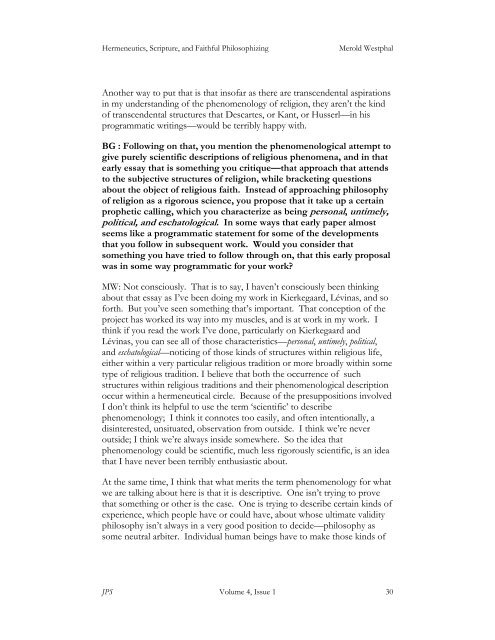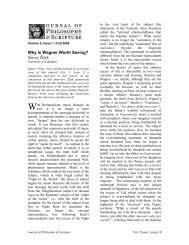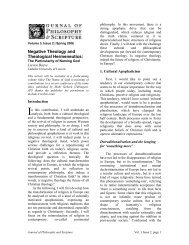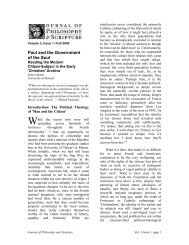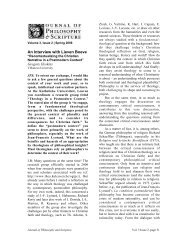interview with Merold Westphal - Journal of Philosophy and Scripture
interview with Merold Westphal - Journal of Philosophy and Scripture
interview with Merold Westphal - Journal of Philosophy and Scripture
You also want an ePaper? Increase the reach of your titles
YUMPU automatically turns print PDFs into web optimized ePapers that Google loves.
Hermeneutics, <strong>Scripture</strong>, <strong>and</strong> Faithful Philosophizing <strong>Merold</strong> <strong>Westphal</strong><br />
Another way to put that is that ins<strong>of</strong>ar as there are transcendental aspirations<br />
in my underst<strong>and</strong>ing <strong>of</strong> the phenomenology <strong>of</strong> religion, they aren’t the kind<br />
<strong>of</strong> transcendental structures that Descartes, or Kant, or Husserl—in his<br />
programmatic writings—would be terribly happy <strong>with</strong>.<br />
BG : Following on that, you mention the phenomenological attempt to<br />
give purely scientific descriptions <strong>of</strong> religious phenomena, <strong>and</strong> in that<br />
early essay that is something you critique—that approach that attends<br />
to the subjective structures <strong>of</strong> religion, while bracketing questions<br />
about the object <strong>of</strong> religious faith. Instead <strong>of</strong> approaching philosophy<br />
<strong>of</strong> religion as a rigorous science, you propose that it take up a certain<br />
prophetic calling, which you characterize as being personal, untimely,<br />
political, <strong>and</strong> eschatological. In some ways that early paper almost<br />
seems like a programmatic statement for some <strong>of</strong> the developments<br />
that you follow in subsequent work. Would you consider that<br />
something you have tried to follow through on, that this early proposal<br />
was in some way programmatic for your work?<br />
MW: Not consciously. That is to say, I haven’t consciously been thinking<br />
about that essay as I’ve been doing my work in Kierkegaard, Lévinas, <strong>and</strong> so<br />
forth. But you’ve seen something that’s important. That conception <strong>of</strong> the<br />
project has worked its way into my muscles, <strong>and</strong> is at work in my work. I<br />
think if you read the work I’ve done, particularly on Kierkegaard <strong>and</strong><br />
Lévinas, you can see all <strong>of</strong> those characteristics—personal, untimely, political,<br />
<strong>and</strong> eschatological—noticing <strong>of</strong> those kinds <strong>of</strong> structures <strong>with</strong>in religious life,<br />
either <strong>with</strong>in a very particular religious tradition or more broadly <strong>with</strong>in some<br />
type <strong>of</strong> religious tradition. I believe that both the occurrence <strong>of</strong> such<br />
structures <strong>with</strong>in religious traditions <strong>and</strong> their phenomenological description<br />
occur <strong>with</strong>in a hermeneutical circle. Because <strong>of</strong> the presuppositions involved<br />
I don’t think its helpful to use the term ‘scientific’ to describe<br />
phenomenology; I think it connotes too easily, <strong>and</strong> <strong>of</strong>ten intentionally, a<br />
disinterested, unsituated, observation from outside. I think we’re never<br />
outside; I think we’re always inside somewhere. So the idea that<br />
phenomenology could be scientific, much less rigorously scientific, is an idea<br />
that I have never been terribly enthusiastic about.<br />
At the same time, I think that what merits the term phenomenology for what<br />
we are talking about here is that it is descriptive. One isn’t trying to prove<br />
that something or other is the case. One is trying to describe certain kinds <strong>of</strong><br />
experience, which people have or could have, about whose ultimate validity<br />
philosophy isn’t always in a very good position to decide—philosophy as<br />
some neutral arbiter. Individual human beings have to make those kinds <strong>of</strong><br />
JPS Volume 4, Issue 1 30


